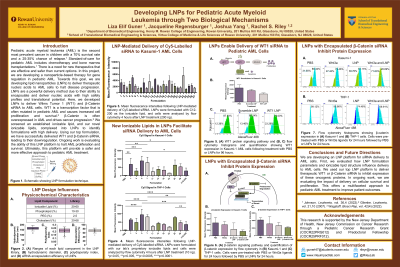Nanomedicine and Nanoscale Delivery (Focus Group - NND)
(417) Developing LNPs for Pediatric Acute Myeloid Leukemia through Two Biological Mechanisms

Introduction: Pediatric acute myeloid leukemia (AML) is the second most prevalent cancer in children with a 68% survival rate and a 30% chance of relapse. Standard-of-care is chemotherapy and bone marrow transplantations, but these have limited efficacy and severe side effects. We are developing lipid nanoparticles (LNPs) to deliver siRNA to halt disease progression by inhibiting β-catenin and WT1 expression in AML cells. Both proteins drive cancer progression and chemotherapy resistance. This represents a translatable approach to AML by inhibiting cellular proliferation through two biological pathways.
Learning Objectives:
- Understand the advantages/disadvantages of using drug delivery platforms for therapeutic delivery.
- Realizing the potential for LNPs to halt oncogenic signaling in pediatric AML.
Joshua Yang – Doctoral Student, Rowan University; Jacqueline Regensburger – Undergraduate Student, Rowan University; Rachel Riley – Assistant Professor, Rowan University

Liza E. Guner
Doctoral Student
Rowan University, United States

